SERMONS IN CANDLES:
BYC. H. SPURGEON.
Lecture 2
Continued..............Final
Do you remember the old charwoman nurse? Was her name Sarah Gamp or Betsy Prig? One evening, when you were supposed to be asleep. you saw her, in the glass. stirring your gruel, and she took a pinch of snuff right over the cup, to regale her lovely nose. No: you did not take your gruel like a man; your stomach turned at the mess and at the creature who had stirred in the droppings of her snuff. Her voice was hoarse; she stamped with her two beetle-crushers when she traversed the room; she made your pillow hard when she shook it up; and she seemed an ogre in your eyes. The only good point about her was that you got well all the quicker, that you might escape from her clutches.
Honoured among women be the memory of Florence Nightingale! Her name and fame gave an impetus to the movement for trained nurses, which has been so fraught with comfort to thousands. Our young ladies who devote themselves to this sacred service deserve all the encouragement we can give them. God bless you, gentle night-lights!
Our night-light is set in water to make it quite safe. We do well to guard ourselves against the personal dangers of our position: even when doing good we must be on our watch lest we fall into temptation.
Night-lights are marked to burn just so many hours, and no more; and so are we. Long may you each one shine and yield comfort to those around you; but, whether your hours be few or many, may you burn steadfly to the end! If we may but fulfil our mission it will be enough. May none of us take fire in a wrong way, blaze into a shamefull notoriety, fill the air with an ill sayour, and then go out in darkness ere half our work is done!
There is room for fresh forms of candle still, and we should not wonder if the article once more became the subject of advertising, as soap is at present. In other lands, as, for instance, on the north- west coast of America, candles have a singular originality about them; for there they burn a fish, a species of smelt, which grows nearly a foot long and is full of fat. We should rather think the smelt smelleth, when they put a rush or a piece of bark down the centre of him, and make a natural candle of him. The light must be rather fishy; but so is everything else in that region, and therefore it does not matter much.
There is, in China and the East Indies, a candle fly; but though it bears the name, we do not suppose that it serves the purpose of a candle. We have heard of reading by the llght of glow-worms in our hedges, but we doubt whether ordinary type could thus be deciphered. Glow-worms remind us of most expositors, of whom Young says,
And hold their failing candles to the sun."
Fire-flies might serve our turn better, for they are like living lamps. They had a great charm for us when we saw them for the first time by the Italian lakes. The night-light is a sober night-comforter: may it be long before any of you learn its value in long hours of suffering!
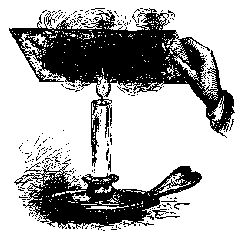 Here is a candle which is as good as candle can well hope to be. The light is clear and pure. Speaking popularly, the candle is perfect, and is giving forth a bright light. Yet, if you knew it better, you would take another view of it. It is disseminating black smoke as well as clear light. Here is a sheet of bright tin plate. Just hold it over the candle, and you will see that it is yielding something other than light. Of course, there wilI be nothing on the bright tin but that which comes out of the candle.
Here is a candle which is as good as candle can well hope to be. The light is clear and pure. Speaking popularly, the candle is perfect, and is giving forth a bright light. Yet, if you knew it better, you would take another view of it. It is disseminating black smoke as well as clear light. Here is a sheet of bright tin plate. Just hold it over the candle, and you will see that it is yielding something other than light. Of course, there wilI be nothing on the bright tin but that which comes out of the candle.
Will one of you be so good as to put his finger on this tin, and then touch the tip of his nose and his forehead with it? I cannot persuade any of you to try the effect; but if you did so, you would prove to us all that the best of candles does not field unmingled light. I am told that a man may be perfect. Well -- no doubt we ought to be so, and in the Biblical sense I hope many are so. But if all possible tests were applied to them, a measure of imperfection would be found in the brightest of the saints. It is as old Master Trapp says, "We may be perfect, but not perfectly perfect." Grace makes us perfect after our kind; but only in glory will the last remains of sin be altogether removed.
I should not care to be like this sheet of tin, used to expose the faults of others, when it would be better to leave them unnoticed. Some peeping Toms have the gift of detecting the imperfections of good men: I do not covet their talent. In the process, these prying folk, like this tin, grow very sooty themselves. Do not attempt to imitate them.
In the next similitude you have a simpler reminder of the imperfections to which men are liable. A candle needs snuffers. and men need chastisements;
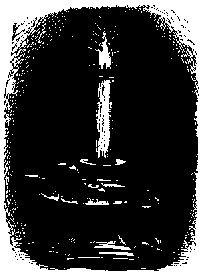 for they are both of them subject to infirmity. In the temple of Solomon there were snuffers and snuff-dishes; but they were all of gold. God's rebukes are in love, and so should ours be: holy reproofs in the spirit of affection are snuffers of gold. Never use any other, and use even these with discretion, lest you put out the flame which it is your aim to improve. Never reprove in anger. Do not deal with a small fault as if it were a great crime. If you see a fly on your boy's forehead, don't try to kill it with a sledge-hammer, or you may kill the boy also. Do the needful but very difficult work of reproof in the kindest and wisest style, so that the good you aim at may be attained.
for they are both of them subject to infirmity. In the temple of Solomon there were snuffers and snuff-dishes; but they were all of gold. God's rebukes are in love, and so should ours be: holy reproofs in the spirit of affection are snuffers of gold. Never use any other, and use even these with discretion, lest you put out the flame which it is your aim to improve. Never reprove in anger. Do not deal with a small fault as if it were a great crime. If you see a fly on your boy's forehead, don't try to kill it with a sledge-hammer, or you may kill the boy also. Do the needful but very difficult work of reproof in the kindest and wisest style, so that the good you aim at may be attained.
It was a shocking habit of bad boys to snuff the candle, and then open the snuffers and let the smoke and the smell escape. The snuffers are made on purpose to remove the snuff, or consumed wick, and then to quench it by pressure, and prevent any offensive smoke; but young urchins of a mischievous sort would set the snuffers wide and let the filthy smoke fill the room with its detestable odour. So do some who hear of a brother's faults, make them known, and seem to take pleasure in filling society with unsavoury reports. I pray you, do not so. If the candle has something wrong with it, touch it carefully, snuff it with discretion, and shut up the obnoxious matter very carefully. Let us be silent about things which are a discredit to Christian character. Keep an ill report secret; and do not be like the young lady who called in a dozen friends to help her keep a secret, and yet, strange to say, it got out. Remember, you may yourself deserve rebuke one of these days; and as you would like this to be done gently and privately, so keep your remarks upon others within the happy circle of tender love. To rebuke in gentle love is difficult, but we must aim at it till we grow proficient. GOLDEN snuffers, remember; only golden snuffers. Put away those old rusty things -- those unkind sarcastic remarks. They will do more harm than good, and they are not fit things to be handled by servants of the Lord Jesus.
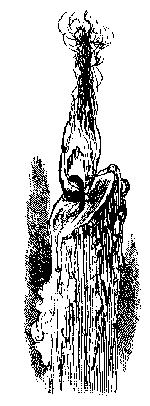 See how precious material runs to waste if the light is not trimmed! There is a thief in the candle, and so it takes to guttering and running away, instead of fielding up its substance to be used for the light. It is sad when a Christian man has some ill habit, or sinister aim. We have seen fine lives wasted through a love of wine. It never came to actual drunkenness, but it lowered the man and spoiled his influence. So is it with a hasty temper, or a proud manner, or a tendency to find fault. How many would be grandly useful but for some wretched impediment! Worldlyness runs away with many a man's energies; love of amusement makes great gutters in his time; or fondness for feasts and gilded society robs him of his space for service. With some, political heat runs away with the zeal which should have been spent upon religion, and in other cases sheer folly and extravagance cause a terrible waste of energy which belonged to the Lord. You see there is fire, and there is light; but something extraneous and mischievous is at work, and it needs to be removed. If this is your case, you may well desire the Lord to snuff you, however painful the operation may be. Depend upon it, we have no life- force to spare, and everything which lessens our consecrated energy is a robbery of God.
See how precious material runs to waste if the light is not trimmed! There is a thief in the candle, and so it takes to guttering and running away, instead of fielding up its substance to be used for the light. It is sad when a Christian man has some ill habit, or sinister aim. We have seen fine lives wasted through a love of wine. It never came to actual drunkenness, but it lowered the man and spoiled his influence. So is it with a hasty temper, or a proud manner, or a tendency to find fault. How many would be grandly useful but for some wretched impediment! Worldlyness runs away with many a man's energies; love of amusement makes great gutters in his time; or fondness for feasts and gilded society robs him of his space for service. With some, political heat runs away with the zeal which should have been spent upon religion, and in other cases sheer folly and extravagance cause a terrible waste of energy which belonged to the Lord. You see there is fire, and there is light; but something extraneous and mischievous is at work, and it needs to be removed. If this is your case, you may well desire the Lord to snuff you, however painful the operation may be. Depend upon it, we have no life- force to spare, and everything which lessens our consecrated energy is a robbery of God.
Here is a sputtering candle. (from footnote: I can give a specimen of it in actual fact, but I do not know how to sketch the sputter on paper.) You can light the thing, but it seems to spit at you, and crackle as if in a bad temper. Never mind: it is its pretty way, and it will get over it, and burn comfortably by-and-by. We once had among us a good brother -- it is years ago, and he is now beyond our censure -- he would always give, and give liberally, too; but he took the money out in grumbling. He thought there were too many appeals; he thought the thing ought to be provided for in another way; he thought -- in fact he seemed to be full of discontented thoughts; but he ended up by saying, "There's my share of it." It was a pity, for he was real good. If any of you have the sputtering habit, I would advise you not to spend much pains in cultivating it: it is not pretty, and does not commend a man to those about him. When a candle has been so long in the cellar that it has become thoroughly damp, it is apt to spit and sputter a little; but there is no reason why you and I should keep in the cellar, and be sick of the blues; let us abide in the sunnier side of the house, and then we shall burn and shine with a happy cheerfulness. I hope we are not cut-on-the-cross, nor born like Attila to be "the scourge of mankind." I suppose it needs all sorts of people to make up a world; but the fewer of the grizzling, complaining sort, the better for those who have to live with them. Our sputtering candle has now got over his weakness, for he has burned out his damp bit; and whenever you and I come to a cantankerous half- hour, may we get through it as fast as possible, and keep ourselves to ourselves all the time, that nobody may know that we have been in the sulks. Go into your growlery, and get it over: better still, go into your closet and get it under.
We have seen a courteous contrivance at some tobacco shops for giving a light to passers-by. It may serve as a suggestion to ourselves for far higher purposes. If we know the divine truth, let us be ready to communicate it, and by our winning manner constantly say, "Take a light."
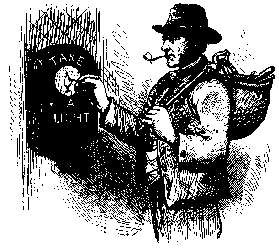 Let us be approachable in reference to spiritual things, and we shall soon have the joy of seeing others taking a light from us. We know people to whom no one would ever speak in the hour of trial; as well might they make a pillow of a thorn-bush. If people to whom they have never been introduced were to intrude their personal sorrows, they would be looked at with one of those searchers which read you from top to toe, and at the same time wither you up. On the other hand, there are faces which are a living advertisement running thus: Good ACCOMMODATION FOR MAN AND GRIEF. You are sure of a friend here. Certain persons are like harbours of refuge, to which every vessel will run in distress. When you want to ask your way in the street, you instinctively shun the stuck-up gentleman of importance; and you most readily put the question to the man with the smiling face and the open countenance. In our church we have friends who seem to say to everybody, TAKE A LIGHT; may their number be greatly multiplied!
Let us be approachable in reference to spiritual things, and we shall soon have the joy of seeing others taking a light from us. We know people to whom no one would ever speak in the hour of trial; as well might they make a pillow of a thorn-bush. If people to whom they have never been introduced were to intrude their personal sorrows, they would be looked at with one of those searchers which read you from top to toe, and at the same time wither you up. On the other hand, there are faces which are a living advertisement running thus: Good ACCOMMODATION FOR MAN AND GRIEF. You are sure of a friend here. Certain persons are like harbours of refuge, to which every vessel will run in distress. When you want to ask your way in the street, you instinctively shun the stuck-up gentleman of importance; and you most readily put the question to the man with the smiling face and the open countenance. In our church we have friends who seem to say to everybody, TAKE A LIGHT; may their number be greatly multiplied!
It should be a joy to hold a candle to another. It will not waste our own light to impart it. Yet holding a candle to another has a bitter meaning, as in these lines :--
That Mynheer Handel's but a ninny:
Others aver that he to Handel
Is scarcely fit to hold a candle."
This candle is upside down, and it cannot be long before it puts itself out.
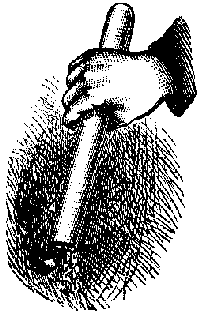 When in our hearts the lower nature is uppermost, and the animal dominates the spiritual, the flame of holy light cannot be long kept alight. When the world is uppermost, and eternal things have a low place in the heart, the sacred life is in serious jeopardy. When the intellect crushes down the affections, the soul is not in an upright state. It needs that matters be quickly righted, or the worst consequences must ensue. Our prayer should rise to God that this happen not to ourselves; and when we see that it is so with others, we should be full of prayerful concern that they may be turned by the hand of God into a true and upright condition.
When in our hearts the lower nature is uppermost, and the animal dominates the spiritual, the flame of holy light cannot be long kept alight. When the world is uppermost, and eternal things have a low place in the heart, the sacred life is in serious jeopardy. When the intellect crushes down the affections, the soul is not in an upright state. It needs that matters be quickly righted, or the worst consequences must ensue. Our prayer should rise to God that this happen not to ourselves; and when we see that it is so with others, we should be full of prayerful concern that they may be turned by the hand of God into a true and upright condition.
Some men who are not quite upright waste much of their influence. To such we might apply the old and almost obsolete word-- candle-waster. It is a pity to lose life in harmful or unprofitable ways.
Here is a very important-looking candle.
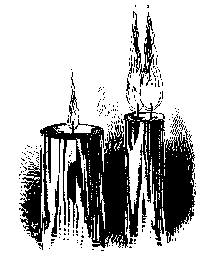 Its dimensions are aldermanic. You expect great flyings from so portly an illuminator. Look at the size of it. But when I light it, the illuminating power is very small. Can you see any light coming from it? It is a star of the smallest magnitude. We have here the maximum of tallow and the minimum of light. The fact is, that only a little of the fat just near the centre ever gets melted. This makes a little well of hot grease, but the rest is as hard and cold as if there were no burning wick in the middle. Thus it is with men of more talent than heart: the chief part of them is never used. Many a great and learned minister, with any quantity of Latin and Greek tallow, is but very little useful because his ability is not touched by his heart. He remains cold as to the bulk of him. Many a great, rich man, with any amount of the fat of wealth, never gets warmed through: he is melted to the extent of a shilling or two, but his thousands are unaffected. Partial consecration is a very doubtful thing; and yet how much we have of it! What is wanted is "grace more abundant," to fuse the whole man, and make every part and parcel of him subservient to God's great design of light-giving.
Its dimensions are aldermanic. You expect great flyings from so portly an illuminator. Look at the size of it. But when I light it, the illuminating power is very small. Can you see any light coming from it? It is a star of the smallest magnitude. We have here the maximum of tallow and the minimum of light. The fact is, that only a little of the fat just near the centre ever gets melted. This makes a little well of hot grease, but the rest is as hard and cold as if there were no burning wick in the middle. Thus it is with men of more talent than heart: the chief part of them is never used. Many a great and learned minister, with any quantity of Latin and Greek tallow, is but very little useful because his ability is not touched by his heart. He remains cold as to the bulk of him. Many a great, rich man, with any amount of the fat of wealth, never gets warmed through: he is melted to the extent of a shilling or two, but his thousands are unaffected. Partial consecration is a very doubtful thing; and yet how much we have of it! What is wanted is "grace more abundant," to fuse the whole man, and make every part and parcel of him subservient to God's great design of light-giving.
The main business is to have plenty of heart. I have noticed that speakers produce an effect upon their audiences rather in proportion to their hearts than their heads. I was present at a meeting where a truly solid and instructive speaker succeeded in mesmerizing us all, so that in another half minute we should all have been asleep. His talk was as good as gold, and as heavy. He was followed by a gentleman who was "all there", what there was of him. He was so energetic that he broke a chair, and made us all draw in our feet, for fear he should come down upon our corns. How the folks woke up! The galleries cheered him to the echo. I do not know what it was all about, and did not know at the time; but it was very wonderful. An express at sixty miles an hour is nothing to that orator. He swept past us like -- well, like nothing at all. He meant it, and we felt that he deserved to be cheered for such zealous intentions. He was all ablaze, and we were willing for a season to rejoice in his light. I do not hold him up as an example, for in warfare we need shot as well as powder; but I could not help seeing that a warm heart and an energetic manner will carry the day, where a cold ponderosity effects nothing. My friend was like the second candle in our wood-cut -- the cobbler's candle with two wicks. His blaze was very large in proportion to the material which sustained it.
In our labour to do good we must not let our learning remain cold and useless. Dr. Manton was one of the best of preachers, being both instructive and simple. On one occasion, however, he preached before an assembly of the great, and he very naturally used a more learned style than was his wont. He felt greatly rebuked when a poor man plucked him by the gown, and lamented that, whereas he had often been fed under his ministry, there had been nothing for him on that occasion..The fire had not been so fierce as the tallow had been cold. It is a dreadful thing when hearers have more use for a dictionary than for a Bible under a sermon. A preacher may pile books on his head and heart till neither of them can work. Give me rather the enthusiastic Salvationist bearing a burning testimony, than your cultured philosopher prosing with chill propriety.
Here is what your wise aunt in the country used to give you at night when you went down to the old farm-house, and time had come for bed. You said, "Aunt, what is this cage for? Is this a mad candle, that it needs to be thus straitly shut up?" "No", she said, "we have had young people here who have been so wicked as to read in bed,
 and you know how dangerous it is. Why, they might set all the bed- curtains alight, and so the house might take fire, and all your uncle's ricks would soon be blazing, and soon the whole village would go like a bunch of matches. So I put the candle in a guard to prevent mischief." Still, after all your aunt's lucid explanation, you did not like the look of this muzzled candle; and I should not wonder if you took it out of its prison, and did a bit of reading by its naked light. Young people are so venturesome! Now, it is very proper to be on your guard, in what you say, and what you do. In all companies it is well to be guarded in your behaviour. But is there not a way of being on your guard without diminishing the light of your cheerfulness? May you not be careful without being suspicious?
and you know how dangerous it is. Why, they might set all the bed- curtains alight, and so the house might take fire, and all your uncle's ricks would soon be blazing, and soon the whole village would go like a bunch of matches. So I put the candle in a guard to prevent mischief." Still, after all your aunt's lucid explanation, you did not like the look of this muzzled candle; and I should not wonder if you took it out of its prison, and did a bit of reading by its naked light. Young people are so venturesome! Now, it is very proper to be on your guard, in what you say, and what you do. In all companies it is well to be guarded in your behaviour. But is there not a way of being on your guard without diminishing the light of your cheerfulness? May you not be careful without being suspicious?
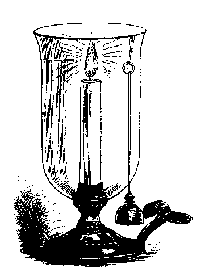 Here is just as effectual a guard for a candle as that wire cage; but it is far more bright and attractive. Let your prudence be always mated to your cheerfulness. Be on the watch, but don't look as if you had been drinking a quart of vinegar. Guard against sin, but do not check everything that would make life bright and happy. Don't put out the candle for fear of burning down the house.
Here is just as effectual a guard for a candle as that wire cage; but it is far more bright and attractive. Let your prudence be always mated to your cheerfulness. Be on the watch, but don't look as if you had been drinking a quart of vinegar. Guard against sin, but do not check everything that would make life bright and happy. Don't put out the candle for fear of burning down the house.
In the matter of being on your guard against impostors who. seek your charity, use common-sense but not harshness. I had rather be taken in every now and then than be always suspicious. One does not care to go about in armour all day and all night; one is glad to get his head out of the helmet, and lay it down on a pillow. It may be useful to us to be taken in sometimes, that we may see how weak we are -- I mean the shrewdest. of us.
This second guard, so pleasant and bright, is my ideal. Here you have care without anxiety, and prudence without gloom. Be it so with us, that with a mortal hatred to all sin, we have a delight in all that is glad, and joyous, and pure.
Here is a candle on a save-all -- an invention which is scarcely ever thought of nowadays, in this age of gas and general extravagance. Every prudent housewife had a save-all to burn up the smallest remnant of candle.
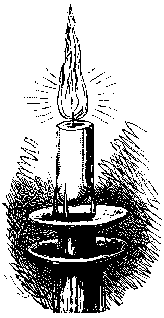 Economy is necessary for the poor, and salutary for the rich. He who would have much to give away should feel that he has nothing to waste. He who was heard to scold about a wasted match was found to be no miser, but a greater giver than anyone else. Use the save-all to preserve every fragment of time. "Redeeming the time, because the days are evil." How much can be done in odd minutes! Many instances could be given to prove that it is so. Sanctify odd minutes, odd pence, and all sorts of oddments, and out of them you can bring glory to God.
Economy is necessary for the poor, and salutary for the rich. He who would have much to give away should feel that he has nothing to waste. He who was heard to scold about a wasted match was found to be no miser, but a greater giver than anyone else. Use the save-all to preserve every fragment of time. "Redeeming the time, because the days are evil." How much can be done in odd minutes! Many instances could be given to prove that it is so. Sanctify odd minutes, odd pence, and all sorts of oddments, and out of them you can bring glory to God.
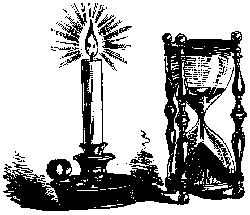 Here is an hour-glass and a candle. As the hour-glass runs, and the candle burns, we mark how the time passes away. In the old Puritan pulpits there used to be an hourglass, and the preacher was expected to preach as long as the sand of the hour-glass was running; which, of course, was just an hour. A witty preacher, having on one occasion only reached to "Eighteenthly" when the hour-glass had run out, and having thirty heads to dilate upon, turned the machine over and cried, "Brethren, let us have another glass." When you hear of the length of time that your ancestors gave to hearing discourses, be ashamed at the grumbling about long sermons, and do try to take in every scrap of the poor pennyworth which we are allowed to give you in three poor quarters of aa hour. Whether we preach, or hear, time is hastening on. Our sands of life will soon run out. Just as we are being borne along irresistibly every moment as the earth speeds in her orbit, so are we being carried away by the resistless course of time. How it flies to a man of middle age! How exceedingly fast to the aged! We may say of the hours, as of the cherubim, "each one had six wings." If everything is made secure by faith in the Lord Jesus, we need not wish it to be otherwise; for the faster time passes, the sooner shall we be at home with our Father and our God
Here is an hour-glass and a candle. As the hour-glass runs, and the candle burns, we mark how the time passes away. In the old Puritan pulpits there used to be an hourglass, and the preacher was expected to preach as long as the sand of the hour-glass was running; which, of course, was just an hour. A witty preacher, having on one occasion only reached to "Eighteenthly" when the hour-glass had run out, and having thirty heads to dilate upon, turned the machine over and cried, "Brethren, let us have another glass." When you hear of the length of time that your ancestors gave to hearing discourses, be ashamed at the grumbling about long sermons, and do try to take in every scrap of the poor pennyworth which we are allowed to give you in three poor quarters of aa hour. Whether we preach, or hear, time is hastening on. Our sands of life will soon run out. Just as we are being borne along irresistibly every moment as the earth speeds in her orbit, so are we being carried away by the resistless course of time. How it flies to a man of middle age! How exceedingly fast to the aged! We may say of the hours, as of the cherubim, "each one had six wings." If everything is made secure by faith in the Lord Jesus, we need not wish it to be otherwise; for the faster time passes, the sooner shall we be at home with our Father and our God
We feel, as we watch the decreasing candle and the falling sand, that we, at least, have no time which needs killing. What we have is all too little for our high and holy purposes. We want not cards, and dice, and scenic displays for a pastime: our time passes all too rapidly without such aids. Those who kill time will soon find that time kills them, and they would gladly give worlds, if they had them, to win back a single hour. Remember the story of Queen Elizabeth's last moments, and take care to spend each hour as carefully as if you had no other hour to follow it.
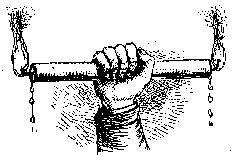 The next illustration is a warning, and , not an example. You have often heard it said of such and such a person, "he is burning the candle at both ends." Spendthrifts waste both capital and interest; and by both neglecting business and wasting their substance on expensive pleasures, they burn the candle at both ends. The vicious not only exhaust their daily strength, but they draw upon the future of their constitutions, so that when a few years have gone they are old men before their time. Beware of burning the candle at both ends. It will go fast enough if you burn it only at one end; for your stock of strength and life is very limited. If there is anyone here who is sinning on the right hand and on the left, let him forbear, and not be in such fearful haste to endless ruin. Let this candle cast a light upon the folly of prodigality, and may the prodigal hasten home before his candle is burned out. Did you ever see a candle used in that way? You do not live with folks so mad; but if you look abroad in the wide world, you may see how thousands are squandered and lives are cut short by burning the candle at both ends.
The next illustration is a warning, and , not an example. You have often heard it said of such and such a person, "he is burning the candle at both ends." Spendthrifts waste both capital and interest; and by both neglecting business and wasting their substance on expensive pleasures, they burn the candle at both ends. The vicious not only exhaust their daily strength, but they draw upon the future of their constitutions, so that when a few years have gone they are old men before their time. Beware of burning the candle at both ends. It will go fast enough if you burn it only at one end; for your stock of strength and life is very limited. If there is anyone here who is sinning on the right hand and on the left, let him forbear, and not be in such fearful haste to endless ruin. Let this candle cast a light upon the folly of prodigality, and may the prodigal hasten home before his candle is burned out. Did you ever see a candle used in that way? You do not live with folks so mad; but if you look abroad in the wide world, you may see how thousands are squandered and lives are cut short by burning the candle at both ends.
Some good people are unreasonable towards ministers and evangelists, and want them to be worked to death. Many a valuable man of God has been lost to the church by his burning his candle at both ends.
This candle has fallen upon evil times. I have a bottle here full of a black material, which is to fall upon the flame of this candle. When I tell you that this bottle contains a quantity of steel-filings, you will at once prophesy that the light will be put out.
Let us see what will happen! Why, well, instead of putting the candle out, I am making it disport itself as candle never did before! Here we have fireworks, which if they do not quite rival those of the Crystal Palace, have a splendour of their own.
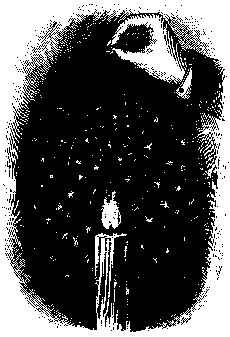 Do you not think that often when Satan tries to throw dust upon a Christian by slander, he only makes him shine the brighter. He was bright before, but now he coruscates, and sends forth a glory and a beauty which we could not have expected from him, for it never could have come from him if it had not been for the temptations, trials, and spiritual difficulties with which he has been assailed? God grant that it may be so with us in all time of our tribulation! May we turn the filings of steel into flashes of light!
Do you not think that often when Satan tries to throw dust upon a Christian by slander, he only makes him shine the brighter. He was bright before, but now he coruscates, and sends forth a glory and a beauty which we could not have expected from him, for it never could have come from him if it had not been for the temptations, trials, and spiritual difficulties with which he has been assailed? God grant that it may be so with us in all time of our tribulation! May we turn the filings of steel into flashes of light!
The next illustration consists of two candles, and I am going to read, if I can, by the light of them. It may have happened to you at home, when you burned candles, that you required two of them. It needed some sense to arrange them if they were of unequal heights. I will place them here in this fashion, and I will sit down to read by their light. I cannot see, for I have put the tall candle in front and the shorter candle behind; the short one is envious, and causes the tall one to cast an injurious shadow over my book. It seemed natural to put the greatest first, but I see that it will not work.
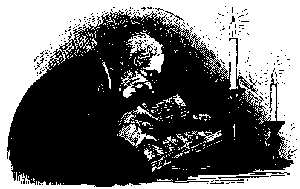 I will put the shorter candle in front, and put the longer one behind. Now I get the light of then, both. Here is the lesson: Always put the weaker brother in the place of henour if you can, and thus make the best use of his light, and prevent his creating a shadow through envy. Notice the order of marching in the Stockwell Orphanage when the children walk out to worship, or to the Common. The rule is, that the smallest boys and girls shall lead the way.
I will put the shorter candle in front, and put the longer one behind. Now I get the light of then, both. Here is the lesson: Always put the weaker brother in the place of henour if you can, and thus make the best use of his light, and prevent his creating a shadow through envy. Notice the order of marching in the Stockwell Orphanage when the children walk out to worship, or to the Common. The rule is, that the smallest boys and girls shall lead the way.
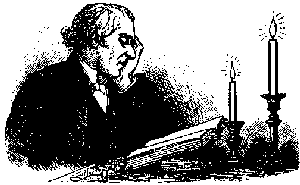 In the old method the taller children blocked up the vision of the little ones, and also went along at a pace too great for the juniors; but on our plan the taller boys can see over the heads of the shorter ones, and the pace is toned down to suit little feet.
In the old method the taller children blocked up the vision of the little ones, and also went along at a pace too great for the juniors; but on our plan the taller boys can see over the heads of the shorter ones, and the pace is toned down to suit little feet.
This is a suggestive rule for the young, and I trust that we who are older will not depart from it. Church members should make this the law of precedence in the house of the Lord, weaker brethren first considered. Let us not go our own pace, but consider their weakness, lest we cause any one of them to stumble. He that has only a little property, a little talent, a little position, and a little grace, must be first thought of. It is not ours to strive for the first places, but in honour to prefer one another, looking more to the benefit of the whole body than to our own comfort or honour.
We will conclude as they do at open-air entertainments -- with the greatest display of our fireworks.
Here are many candles uniting their brilliance; they all hang upon one support, and shine by the same light. May they not represent the church of Christ in its multiplicity, variety, and unity? These candles are all supported upon one stem, they are all giving forth the same light, and yet they are of all manner of sorts, sizes, and colours. A great way off they would seem to be but one light. They are many, and yet but one.
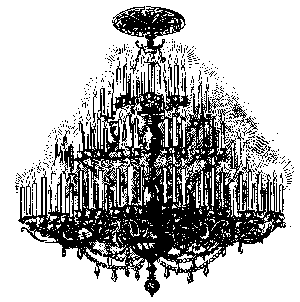 I happened one evening to say that nobody could tell which was the "U.P.", and which was the Free Church, or which was the Wesleyan, or the Primitive, or the Salvation Army, or the Baptists, and so on; but one strong old Baptist assured me that the "Dips" gave the best light. Another said the Presbyterians were, on the whole, cast in the best mould; and a third thought the English Church was made of the truest wax. I told them that some of the Baptists would be the better if they had another Baptism. The Free Churches might be none the worse for being more established in the faith; and even the Methodists might improve their methods. The main question is possession of the one light and fire of God, the flame of divine truth. Those who shine by divine grace are all one in Christ Jesus.
I happened one evening to say that nobody could tell which was the "U.P.", and which was the Free Church, or which was the Wesleyan, or the Primitive, or the Salvation Army, or the Baptists, and so on; but one strong old Baptist assured me that the "Dips" gave the best light. Another said the Presbyterians were, on the whole, cast in the best mould; and a third thought the English Church was made of the truest wax. I told them that some of the Baptists would be the better if they had another Baptism. The Free Churches might be none the worse for being more established in the faith; and even the Methodists might improve their methods. The main question is possession of the one light and fire of God, the flame of divine truth. Those who shine by divine grace are all one in Christ Jesus.
What a glory will there be in the one church when all her members shine, and all are one! May such a day come quickly! Amen.